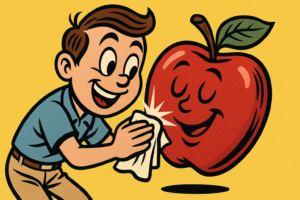Ever wondered why someone who flatters their boss is called an “apple polisher”? The answer reveals centuries of classroom politics!
A person who excessively flatters someone in authority to gain favor or special treatment.
Have you ever been puzzled when someone calls a colleague an “apple polisher”? This colorful idiom has nothing to do with actually polishing fruit!

It describes someone who flatters others for personal gain, often by praising them too enthusiastically.
Originally referring to students bringing shiny apples to teachers, this phrase now captures any attempt to win favor through excessive compliments.
Understanding idioms like this helps you navigate English conversations with confidence, allowing you to recognize the subtle humor when native speakers use such expressions.
Core Meaning
Definition and Figurative Sense
An “apple polisher” is a person who flatters or praises someone, typically in a position of power or influence, in order to gain favor.
The expression draws a vivid picture of a student polishing an apple before presenting it to the teacher—hoping a shiny piece of fruit will lead to better treatment or grades.
Originally, apples were a traditional gift for teachers, symbolizing respect and appreciation. Over time, the act of polishing the apple became associated with superficial flattery.
A Brief Origin Story
In the early 20th century, students in some regions would offer fresh apples to teachers. These apples were often carefully polished, making them gleam as brightly as possible.
This habit eventually gave rise to the phrase “apple polisher,” which pokes fun at anyone who uses small but flashy gestures to impress superiors.
Even though the literal practice of polishing apples is less common now, the idiom lives on.
Common Synonyms
- “Brown noser”
- “Suck up”
These words highlight a similar idea: going overboard with praise to curry favor. While “apple polisher” tends to sound playful, other synonyms might feel stronger or more casual depending on the situation.
Spotting an “Apple Polisher”
A surefire sign of an “apple polisher” is persistent and excessive flattery directed at someone in a position to grant advantages.
This might happen in work environments where a person compliments the boss’s every idea or laughs a little too loudly at every joke.
- Over-the-Top Praise
Listen for exaggerated compliments, such as, “You’re the most brilliant manager I’ve ever met!” It’s natural to give credit where it’s due, but effusive flattery at every turn often feels insincere. - Timing of Compliments
An “apple polisher” tends to show up with warm words or small favors right before important decisions or evaluations. For example, an employee might shower a manager with compliments just before annual reviews. - True Intentions
The hallmark of apple polishing is the motive behind the praise. Genuine admiration is one thing, but constant flattery fueled by self-interest often draws negative attention.
Anecdotes & Humor
Many English speakers have amusing stories of literal confusion with the phrase “apple polisher.” Some recall a moment when they first encountered the term and pictured someone setting up a fruit stand.
One humorous story involves an office worker who brought a basket of perfectly polished apples to a department meeting, hoping to charm the team leader.
Instead of admiration, coworkers rolled their eyes and whispered, “What an apple polisher!”
This lighthearted confusion often underscores the idiom’s meaning: superficial gestures may get you noticed, but not necessarily in a good way.
Practical Uses in Conversation
Most English speakers will understand you if you say, “He’s such an apple polisher,” whether you’re in a corporate setting, an academic environment, or just chatting with friends.
Still, certain contexts might call for more neutral language if you want to avoid sounding blunt.
Sample Sentences
- “John has been praising the manager’s ideas nonstop. He’s quite the apple polisher.”
- “Sarah keeps bringing homemade cookies for the teacher and complimenting her daily. Everyone’s calling her an apple polisher.”
- “You don’t need to be an apple polisher to get ahead here—just do your job well.”
These examples show how the idiom can fit naturally into everyday conversation. They also clarify that it’s not usually a compliment if someone calls you an “apple polisher.”
Memory Tips
Learning idioms can be tricky. Here are a few pointers to keep “apple polisher” firmly in mind:
- Visual Image
Picture a student carefully polishing an apple to impress the teacher. This vivid mental image aligns perfectly with the idea of using false charm to gain advantage. - Connect to Over-the-Top Flattery
Just as polishing an apple makes it shine brighter, someone who overdoes compliments tries to appear more favorable in the eyes of a superior. This visual link helps you recall the term instantly. - Inject Humor
The phrase has a slightly playful ring to it, so have fun with it. Associating humorous scenarios with the idiom can make it easier to remember. - Think of Synonyms
If you remember terms like “brown noser” or “suck up,” you’ll recall that an “apple polisher” is essentially on the same team. The core meaning remains flattering someone for personal gain.
Remembering with Real Scenarios
Consider your daily environment:
Perhaps you’ve seen coworkers sweet-talk the boss right before promotions. Maybe you’ve witnessed classmates shower a teacher with praise before a test.
Realizing how frequently this behavior appears can cement the idiom in your mind. When you see it happen, you might quietly think, “There goes another apple polisher.”
Words & Culture Boost
Idioms like “apple polisher” illustrate how language reflects social dynamics. Sincerity is typically valued, so using flattery as a shortcut can lead to eye-rolling or negative judgments.
Being aware of this idiom and its counterparts broadens your understanding of English-speaking cultures. You’ll know when someone is accused of playing politics at work or turning on the charm just to get a better deal.
Cultural Note
Some learners confuse “apple polisher” with terms that refer to actual fruit handling.
Create Your Own Sentences
Practicing with new idioms is an excellent way to strengthen your English. Try incorporating “apple polisher” into a few sentences of your own:
- “I don’t trust the new intern. He seems like an apple polisher who flatters everyone in charge.”
- “There’s no need to be an apple polisher around here. Hard work speaks louder than empty praise.”
- “She gave the CEO a framed photo of his favorite vacation spot. Everyone labeled her an apple polisher.”
Two sentences at a time can help you speak more naturally. Notice how the idiom adds a dash of color to everyday remarks.
Why “Apple Polisher” Matters
1. Workplace Awareness
Recognizing when people are using flattery for personal advantage helps you interact more effectively. You’ll also avoid labeling sincere praise as mere polishing.
2. Cultural Literacy
Idioms reveal social norms about honesty, respect, and ambition. Being able to decipher them deepens your awareness of how people communicate in various professional and casual settings.
3. Conversational Flair
Knowledge of idioms gives you an extra spark in discussions. Whether you’re chatting with colleagues, friends, or acquaintances, idiomatic phrases can bridge cultural gaps and showcase your command of English.
Pop Quiz: Check Your Idiom Skills
Apple Polisher

Choose Honesty Over Flattery
An “apple polisher” may grab attention, but true respect is earned by consistent effort and sincerity.
While the phrase can be humorous or light-hearted, it also highlights the universal preference for genuine interactions over hollow praise.
When you communicate sincerely, colleagues and friends sense your honesty. Over time, genuine relationships and trust trump any quick advantage gained through excessive flattery.
Key Takeaways
- The “apple polisher” idiom paints a picture of someone using superficial gestures and praise to win favor.
- Historical references to students handing polished apples to teachers inspired this lighthearted but pointed expression.
- Synonyms like “brown noser” or “suck up” echo the same concept in different tones.
- Recognizing apple polishing helps you read the room more accurately, avoid naive misunderstandings, and respond confidently.
- True authenticity remains the best approach to building long-lasting respect in English-speaking settings.
Consider mixing this idiom into your next conversation if you see someone showering a boss or mentor with flowery compliments.



However, be cautious: it’s not necessarily polite to say it directly unless you’re joking with close friends.
Remember, a shiny exterior isn’t everything. Sincerity, especially in professional or personal relationships, always wins the day.









Comment